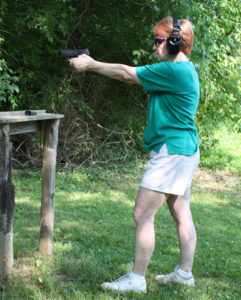Situational Awareness Part 2
Part II
 Last month I discussed some aspects of Situational Awareness, mostly from people who knew much more about it than I did. In particular, I owe much to Ed Lovette who has written about this aspect of staying safe in an unsafe world and has taught it to the CIA. I met him when he was teaching us about it as part of a course surviving a mass killer incident at Tactical Defense Institute in Ohio. Most of this material came from the first chapter of the forthcoming Seventh Edition of The Concealed Handgun Manual.
Last month I discussed some aspects of Situational Awareness, mostly from people who knew much more about it than I did. In particular, I owe much to Ed Lovette who has written about this aspect of staying safe in an unsafe world and has taught it to the CIA. I met him when he was teaching us about it as part of a course surviving a mass killer incident at Tactical Defense Institute in Ohio. Most of this material came from the first chapter of the forthcoming Seventh Edition of The Concealed Handgun Manual.
This month I want to give you stories involving Situational Awareness. The first is a horror story that might have been prevented by two of the victims. The second is about a grandmother who avoided a home invasion by being particularly alert.
Petit Family Incident
When driving, be sure to use your mirrors. Break conventional thought patterns by ascertaining what you are really seeing.
An example of criminals following potential victims home happened in Cheshire, Connecticut in 2007. What made it a national story in addition to the brutal nature of the crime was that it happened to a white upper middle class family in an upper middle class town not known for its high crime rate. Originally an agricultural center, it had become a residential suburban community with a population of twenty-nine thousand. Money Magazine has rated Cheshire one of the one hundred best small towns in the nation.
On Sunday, July 22, 2007, two paroled criminals were looking for a home invasion prospect. Steven Hayes, a career burglar and crack addict, had recently been released from prison. Joshua Komisarjevsky, a career burglar who preferred entering homes at night, had also been recently released from prison. “Robbing a house is better than any drug I’ve ever tried,” he said, according to a statement from a former girlfriend.
They parked in a shopping center near the exit to a supermarket and waited. They knew they had a prospect when they saw Jennifer Hawke-Petit, 48, and her 11-year-old daughter Michaela leave the store and get into a white late-model Mercedes. Michaela was preparing supper for her family. She had needed some extra ingredients for the meal so she and her mother had driven to the grocery store to pick up these items. They were spotted in the parking lot of the grocery store by the parolees who followed them home.
The two parolees followed the Mercedes to the Petit house on a quiet residential street. This was the home Dr. William Petit, a fifty-year-old endocrinologist and expert on diabetes, shared with his wife and two daughters, Michaela and Hayley, 17.
Be particularly alert to anyone who appears to be following you, particularly if you are going home. If Mrs. Petit or her daughter had spotted the tail and driven to a police station, things might have ended differently.
The criminals quickly cased the house and decided they were going to come back later that night. The parolees returned about 3:00 a.m., July 23, and entered the house through an unlocked basement door. They were surprised to find William Petit asleep on a couch on the main floor of the house. The rest of the family was asleep in bedrooms upstairs.
Petit testified that he awoke when one of the men was hitting him over the head with a baseball bat. They took him down to the basement and tied his hands and feet with rope and plastic ties. Sometime later they told Mrs. Hawke-Petit they would not hurt her or her family if she would drive to the bank and withdraw $15,000 from her account.
One of the men drove her to the bank and parked outside so he could see what she was doing. The court saw the video tape of her dealing with a teller. She managed to slip the teller a note saying that her family was being held hostage and she was withdrawing the money under duress. After Hawke-Petit had gone, the bank called the police who eventually surrounded the house along with firefighters. But no one wanted to go in because they were concerned about a hostage situation.
The cops were in a no win situation. “They did what they thought was the responsible thing,” Lovette said.
Meanwhile Dr. Petit had managed to get his hands free but not his ankles so he hopped out of the basement to get help and was found by the police. Inside the house, one of the parolees raped then strangled Hawke-Petit. Her two daughters were tied spread-eagled on their beds. Michaela was also raped. The two men poured gasoline over the women and set the house on fire. They tried to escape in an SUV owned by the Petits but were blocked in by police cars at the end of the street. They smashed into several police cars and were captured when the SUV stalled.
Steven Hayes, 44, and Joshua Komisarjevsky, 27, were charged with the capital murders of Jennifer Hawke-Petit and her two daughters. Their burned bodies were found in the house after the fire department put out the fire.
Both perpetrators were tried, found guilty, and sentenced to death. However, Connecticut abandoned the death penalty in 2015 so they will likely spend the rest of their lives in prison.
“The smoldering char of the Petit house and a suburban street in Cheshire, filled with fire trucks and police cars, was chilling evidence that there is no social contract that protects the good people among us,” Lovette said. “Even if you pay your mortgage, mow your lawn, and send your kids to good schools, live as decently and honorably as the Petits; evil can still find you, even while you’re sleeping in your own bed.”
Sylvia Hall
From the road, you can’t see the house in rural Kentucky where Sylvia Hall and her husband Tom live. The rustic house that they build themselves is six hundred feet back from the county road and is hidden by trees. It is unusual for anyone but friends to drive up the gravel road to the house. Even friends usually phone first.
So, on that Saturday morning, Sylvia Hall was suspicious when she heard the noise of a vehicle coming up the driveway. It was about 10:30 a.m. and Hall, a sixty-eight-year-old grandmother at the time, was doing housework. She was alone except for two small terriers. Her husband worked at a Lowe’s Home Improvement store in Louisville about fifteen miles to the west. He had left about 7 a.m.
She was dusting at the time, so she looked out and saw a dirty-looking tan-colored Volkswagen van with curtains on the windows heading towards the back door.
“I thought that doesn’t look good. So I went and got my handgun, old Betsy; I name my guns,” Hall said.
Old Betsy, a Smith & Wesson M&P 40 semi-automatic, was in her purse in the next room. She grabbed the gun and held it behind her back as she went to the door. “If it was something legitimate, I wasn’t going to be rude.”
Three young men got out of the van and headed for the back door. Hall noticed that the driver stayed in the vehicle. The three crossed the brick patio and the one in the lead stood on the bottom of two steps in front of the back door. All three were wearing blue jeans while the one in the lead was wearing a pale yellow Polo shirt. The other two stood behind him on the patio looking around. Hall stood in the doorway with the door open but with the screen door locked to keep her dogs in while she was doing the housework.
Yellow Shirt appeared to be the spokesman. He said they were evangelicals and had to come in and read to Hall from the bible. To her, they didn’t look like evangelicals and she saw no evidence that they had a bible.
“No, I’m Catholic and I read my own bible; you can’t come in,” Hall told the young men.
“We have to come in and read to you,” Yellow Shirt persisted.
“You are not coming in my house,” Hall repeated.
Yellow Shirt had hold of the screen door and was trying to jerk it open but it was locked.
“When he grabbed the screen door and was jerking on it, I just brought Old Betsy around and told them, I said: ‘Betsy said you couldn’t come in.’”
Old Betsy’s snout as Hall pointed her at them, must have reminded them that they had an urgent appointment in Louisville. They sprinted to the van, jumped in, and the driver took off like the revenuers were after them, spraying gravel as the driver accelerated down the driveway.

Sylvia Hall at practice with “Old Betsy,”
a Smith & Wesson MP40.
Hall did not go outside, because she didn’t know if there were any more of them so she did not get a license plate number. She called the county police and gave them descriptions of the young men and the van.
“I was so angry that people would come to your house and try to take everything you’ve got. I really wasn’t afraid at the time. Then after I called the police, I thought I’ll sit down for a minute. I thought, Oh my God, and I went in the bathroom and threw up.”
She told her husband what had happened when he got home from work. “I think she handled herself quite well. I was very proud of her,” he said.
As far as she knows, the police never did catch the robbers.
The experience changed her life. Sylvia decided she wanted to do something to help others in the community cope with home invasions and other criminal attacks. She called the NRA and during the following two years took several training courses to become an NRA firearms instructor. She also became qualified by the state to teach the Kentucky concealed weapons course.
Each month she teaches an NRA pistol class and a Kentucky CCW course at a local gun club. Most of her students are women varying in age from about thirty to eighty-five but she has taught a few men.
Her son is a retired sergeant-major in the Marine Corps and a firearms instructor and her husband is a former Marine.
Her husband built a range on their six-acre farm with a couple of target stands against a hill behind the creek. For her birthday she got a rotating target.
“Some women want flowers or jewelry for their birthday,” Hall said. “I wanted a rotating target.”



